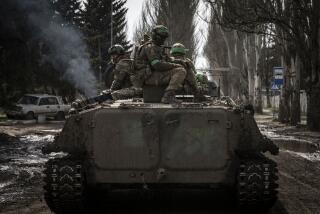Metal Monster Ready to Rumble
- Share via
NEAR FALLOUJA, Iraq — The tank commander wanted the infantrymen to understand a central point.
“Tanks don’t clear buildings. We just blow ‘em away and destroy ‘em,” Cpl. Anthony Gantt told the assembled foot soldiers Tuesday. “You have to clear ‘em out.”
The anticipated assault on the nearby Iraqi insurgent stronghold of Fallouja would involve many modes of attack. But tanks -- specifically, the behemoth M-1A1 Abrams piloted by Gantt and his comrades -- are likely to play a pivotal role in the torrent of urban warfare.
Tanks are expected to be at the forefront of the initial thrust into the city, providing cover for infantrymen, blasting enemy positions and drawing fire that will reveal insurgents’ locations. The 67-ton metal giants, with their imposing 120-millimeter cannons and arsenal of other weapons, are expected to rumble through the streets wreaking destruction.
In recent days, infantry units stationed west of Baghdad have been working closely with tank crews in an effort to coordinate their operations. Foot soldiers do not operate in conjunction with tanks on a regular basis, so there is a need for rehearsal.
“Our job is to support the infantry,” said Lt. David Klingensmith, a tank commander who was overseeing a practice session this week.
In the field, an Abrams prowled along, lifting clouds of dust, while a squad of Marines walked beside and behind -- but not too close because tanks need space to operate. The ground troops also protect the tank, looking out for rooftop snipers, bomb throwers and other assailants.
The young Marines of Charlie Company, 1st Battalion, 8th Regiment, clambered aboard the lethal machine like the schoolkids many were not long ago. Crews displayed controls and weapons systems, while curious Marines asked pointed questions about the range and lethality of the tank’s weapons and just how this Goliath could assist them in the upcoming scrap.
All displayed the enthusiasm for battle that has long been the Marines’ trademark. For many, an adrenalin-pumping firefight is preferable to the frequently deadly indirect attacks -- mortar and rocket strikes, roadside bombs -- that have characterized a conflict in which the enemy is often a phantom presence.
“Guys are just itching to go,” said Lance Cpl. Sean Storey, a 19-year-old with a year and a half in the Marines. “This is what we have been hoping for since we got to Iraq. This is why I joined the Marines.”
They practiced alongside a shrapnel-littered field at a former base from the days of Saddam Hussein’s rule. The not-so-distant rumble of artillery and mortar rounds punctuated the exercise.
Fallouja is the principal insurgent stronghold that U.S. officials and Iraq’s interim government hope to reassert control over before Iraqi elections scheduled for January.
No one expects an easy fight in Fallouja, even if the tanks and other U.S. firepower are more potent than the weaponry used during April’s aborted Marine assault on the city. Back then, insurgents attacked U.S. forces in near-suicidal waves at times. The rebels say they are defending their homeland against invaders.
Insurgents have had more than half a year to prepare their defenses, constructing berms, digging ditches and booby-trapping roads, buildings, cars and almost everything else. One Marine said he anticipated “a wall of frag,” referring to an onslaught of shrapnel and gunfire.
The Marines express confidence that their training and weaponry will overcome the entrenched Falloujans relatively quickly. But they all know there will be casualties.
As Gantt said, it will be up to the infantrymen to go in and clear out buildings, even if the tanks have blown them full of holes. Rubble can provide ideal cover.
As the training progressed Tuesday, the Marines of Charlie Company took time for a short promotion ceremony. Staff Sgt. Corey Lohr pinned the lance corporal chevrons on Pvt. Ronald B. Cook, 19, of Mississippi.
“We all know what we have to do,” Cook said afterward. “We need to go in, get a job done and get out. That’s it.”
The Marines returned to their drill field, taking positions alongside and behind the rumbling, tracked vehicle that, Marines say, should help lead the way to Fallouja.










